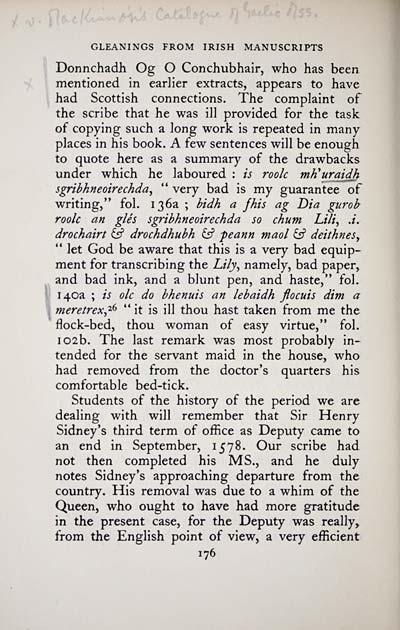Download files
Complete book:
Individual page:
Thumbnail gallery: Grid view | List view

GLEANINGS FROM IRISH MANUSCRIPTS
Donnchadh Og O Conchubhair, who has been
mentioned in earlier extracts, appears to have
had Scottish connections. The complaint of
the scribe that he was ill provided for the task
of copying such a long work is repeated in many
places in his book. A few sentences will be enough
to quote here as a summary of the drawbacks
under which he laboured : is rook mKuraidh
sgribhneoirechda^ ** very bad is my guarantee of
writing,'* fol. 136a ; btdh a fhis ag Dia gurob
rook an glés sgribhneotrechda so chum Ltli^ ./.
drochairt í^ drochdhubh <y feann maol í£ deithneSy
** let God be aware that this is a very bad equip-
ment for transcribing the L//y, namely, bad paper,
and bad ink, and a blunt pen, and haste," fol.
|; 140a ; is ok do bhenuis an kbaidh flocuis dim a
\ meretreXy^^ "it is ill thou hast taken from me the
' flock-bed, thou woman of easy virtue,'* fol.
102b. The last remark was most probably in-
tended for the servant maid in the house, who
had removed from the doctor's quarters his
comfortable bed-tick.
Students of the history of the period we are
dealing with will remember that Sir Henry
Sidney's third term of ofiice as Deputy came to
an end in September, 1578. Our scribe had
not then completed his MS., and he duly
notes Sidney's approaching departure from the
country. His removal was due to a whim of the
Queen, who ought to have had more gratitude
in the present case, for the Deputy was really,
from the English point of view, a very efficient
176
Donnchadh Og O Conchubhair, who has been
mentioned in earlier extracts, appears to have
had Scottish connections. The complaint of
the scribe that he was ill provided for the task
of copying such a long work is repeated in many
places in his book. A few sentences will be enough
to quote here as a summary of the drawbacks
under which he laboured : is rook mKuraidh
sgribhneoirechda^ ** very bad is my guarantee of
writing,'* fol. 136a ; btdh a fhis ag Dia gurob
rook an glés sgribhneotrechda so chum Ltli^ ./.
drochairt í^ drochdhubh <y feann maol í£ deithneSy
** let God be aware that this is a very bad equip-
ment for transcribing the L//y, namely, bad paper,
and bad ink, and a blunt pen, and haste," fol.
|; 140a ; is ok do bhenuis an kbaidh flocuis dim a
\ meretreXy^^ "it is ill thou hast taken from me the
' flock-bed, thou woman of easy virtue,'* fol.
102b. The last remark was most probably in-
tended for the servant maid in the house, who
had removed from the doctor's quarters his
comfortable bed-tick.
Students of the history of the period we are
dealing with will remember that Sir Henry
Sidney's third term of ofiice as Deputy came to
an end in September, 1578. Our scribe had
not then completed his MS., and he duly
notes Sidney's approaching departure from the
country. His removal was due to a whim of the
Queen, who ought to have had more gratitude
in the present case, for the Deputy was really,
from the English point of view, a very efficient
176
Set display mode to: Large image | Transcription
Images and transcriptions on this page, including medium image downloads, may be used under the Creative Commons Attribution 4.0 International Licence unless otherwise stated. ![]()
| Early Gaelic Book Collections > Matheson Collection > Gleanings from Irish manuscripts > (188) |
|---|
| Permanent URL | https://digital.nls.uk/76714680 |
|---|
| Description | Items from a collection of 170 volumes relating to Gaelic matters. Mainly philological works in the Celtic and some non-Celtic languages. Some books extensively annotated by Angus Matheson, the first Professor of Celtic at Glasgow University. |
|---|
| Description | Selected items from five 'Special and Named Printed Collections'. Includes books in Gaelic and other Celtic languages, works about the Gaels, their languages, literature, culture and history. |
|---|

